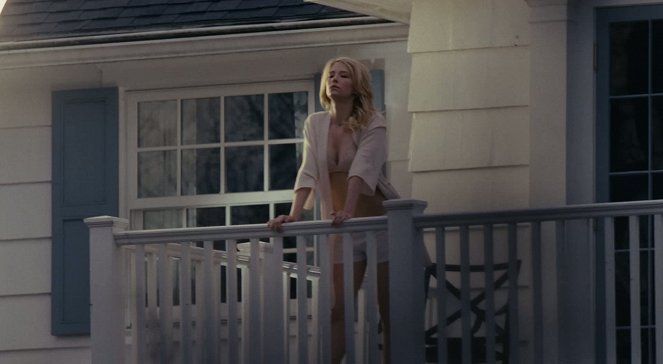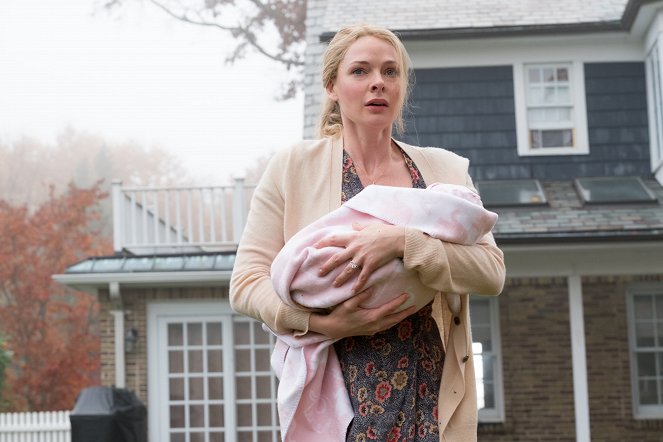Rendező:
Tate TaylorForgatókönyvíró:
Erin Cressida WilsonOperatőr:
Charlotte Bruus ChristensenZeneszerző:
Danny ElfmanSzereplők:
Emily Blunt, Rebecca Ferguson, Haley Bennett, Justin Theroux, Luke Evans, Edgar Ramirez, Allison Janney, Lisa Kudrow, Laura Prepon, Marko Caka (több)Tartalmak(1)
Rachel (Emily Blunt) minden áldott nap felül a vonatra, hogy bemenjen a városba, és minden áldott nap kétszer elhalad a régi háza előtt. A ház előtt, ahol a volt férje (Justin Theroux) az új feleségével (Rebecca Ferguson) és nemrég született gyermekükkel lakik. Rachel képtelen elengedni a múltat, és miközben fájdalmát alkohollal próbálja enyhíteni, egy fiatal párról talál ki történeteket, akiket a várakozó vonatról figyel meg. A nő elképzelése szerint Megan (Haley Bennett) és Scott (Luke Evans) élete tökéletes: gyönyörűek, szerelmesek és hűségesek egymáshoz. Ám egy nap valami olyan megdöbbentőt pillant meg a vonat ablakából, ami mélységes félelemmel tölti el. A kétségbeesett nő mindenáron ki akarja deríteni az igazságot. Tanúnak jelentkezik a rendőrségen, ám alkoholizmusa és emlékezetkiesései miatt senki se hisz neki még ő maga sem... (Freeman Film)
(több)Videók (31)
Recenziók (13)
A csinos formalitás sikeresen elfedi a történet rejtett titkát, a színészeket pedig jó nézni. De a titok leleplezése csak egy közönséges thrillert csinál belőle, amelyben nincs nyoma leleményességnek, amelyre csak a népszerűsített könyvnek köszönhetően mennek tömegek a moziba. És Fincher miatt.
()
Misery porn with didactic directing and a comically transparent screenplay, from which the killer emerges after about twenty minutes. So, all that remains is to enjoy the overacting of all of the participants, a cute-looking gloom and an exploitative ending, which could be provocative in the hands of a more capable director. It's a Gone Girl for stay-at-home moms and a wannabe psychological probe into relationship misery. As a thriller, no. As an unintentionally cheesy chick flick from the dark red library's provenance? Sure.
()
A rare case where the adaptation perfectly copies the emotional and subjectively perceptual arc of the original, including its greatest strengths and weaknesses. It builds a perfectly constructed female triangle, pulling closer with every scene, a paranoid atmosphere where no explanation of the mystery is too far-fetched – and unfortunately, a conclusion that disappointed me as the absolute simplest and altogether black-and-white solution. Despite that, thanks to Emily Blunt, I was considering a higher rating for a long time, as she portrayed Rachel with credible emotions even in the subtlest nuances. Haley Bennett prevented me from doing so, sine despite her undeniable charms, she is too cold and cannot fully portray the idealized Megan due to her completely superfluous transparency.
()
I like thrillers in a similar vein. That’s also the reason why I gave it one more star than the movie deserves. For most of the runtime, I was actually quite conflicted and I didn’t know what to think about any of the main characters that appeared in the movie. The movie had a strong source material by Paula Hawkins and so I rummaged through the past, the present, and subsequently also fiction and alternative facts. Eventually, the last half an hour, which had balls, started, and it explained a whole plethora of characters, which satisfied me quite a bit. Even though I predicted it a bit differently. Nevertheless, I must admit that there is something about this movie, and even though I spent 90 minutes as if under the haze of alcohol, it still managed to rise to a solid four-star review.
()
Just as when reading the novel on which The Girl on the Train is based, it is impossible to avoid comparisons with Gone Girl. Both films have noirish, bleak visual stylisation (in Fincher's case, that’s the director’s signature; in Taylor’s, it’s rather an imitation), both depict marriage as a life-threatening game filled with manipulation, lies and hypocrisies (with a cynical sense of detachment and ironic distance from the characters in Gone Girl, but in all seriousness in The Girl on the Train), and both films alternate between multiple narrators (with greater sophistication in Gone Girl). Compared to the slightly misogynistic Gone Girl, The Girl on the Train is more explicitly targeted at adult female viewers, who are encouraged through Rachel’s story to rely on themselves rather than on what they are told or what others want for them. Especially men. ___ As in the book, the final reversal of the roles of victim and offender is a tribute to the emphatic pro-woman cri de coeur, which greatly degrades the impact and sheds doubt on the meaning of the film’s portrayal of an alcoholic woman. Built more on strong acting performances than on narrative games, the film is largely conceived not as a crime thriller, but as a psychological study of an internally insecure woman in search of her lost (self-)confidence. The ending, which unlike the book contains a needless epilogue, suddenly negates this feeling of shame and guilt, intensified by the excellent Emily Blunt throughout the film. As in many of Hitchcock’s thrillers involving the transfer of guilt, the perpetrator was someone other than the film had previously indicated, which in this case, however, serves to resolve only the crime aspect of the narrative, but not the psychological dimension, which comes off as unsatisfying. ___ Thanks to the graphic continuity of the shots and precisely timed editing, Taylor succeeds in fostering the impression of fluidity and interconnectedness of the individual segments of the narrative, or rather of the individual narrators. Flashbacks showing various distant episodes from Megan’s life intensify the suspense with respect to what actually happened. Like Rachel, with her memory affected by sipping vodka, we know only fragments of reality and we have to continually add to and adjust the overall picture on the basis of new information. Like the protagonist, we also mistakenly infer who we are seeing in some of the images based on the available context. The unreliable narrative thus does not serve as the screenwriter’s calculated attempt to deceive the viewer, but is organically connected with the protagonist’s mental state and cognitive abilities. As a result, The Girl on the Train is a compact and focused film, most of whose shortcomings (the mishandled ending, lack of detachment, occasionally melodramatically forced sense of tragedy) stem from the book’s premise or are associated with the audience’s expectations (it’s not a thriller, but a drama). If you see romantic relationships as a cynical comedy that sometimes bring a smile to your face, Gone Girl will probably remain your favourite relationship movie. If you prefer a more tragic approach, The Girl on the Train may suit you better. 80%
()
(kevesebbet)
(több)



Hirdetés